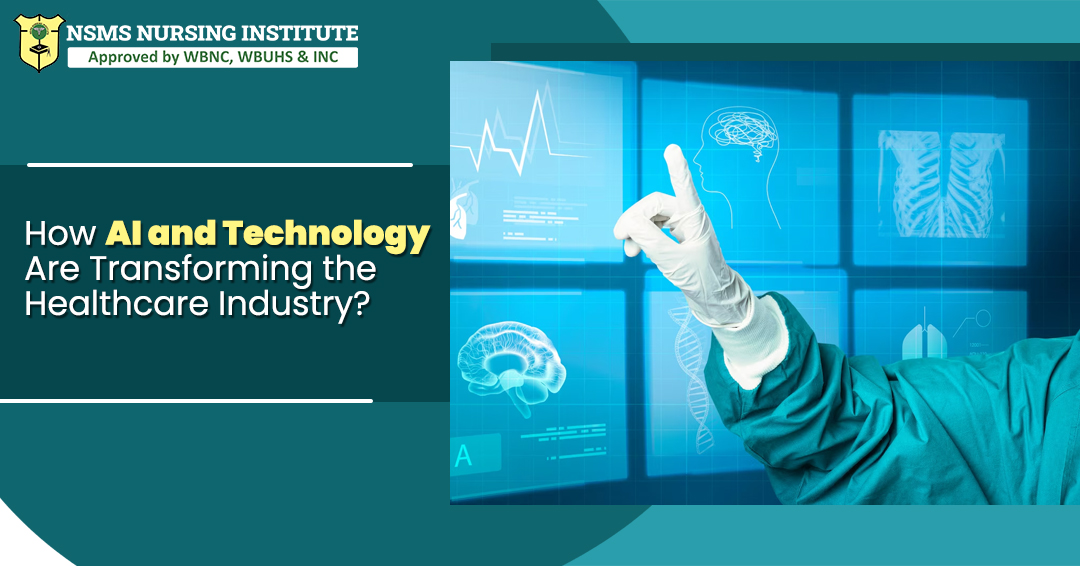How AI and Technology Are Transforming the Healthcare Industry?

How AI and Technology Are Transforming the Healthcare Industry?
Published On: July 28, 2025
The intersection of high-tech artificial intelligence (AI) and technologies has transformed the healthcare industry, especially nursing. With the demand for high-quality patient care, demand for efficient nurses capable of performing well with high-tech equipment also rises.
For young students looking to establish a profession in this changing domain, an education at a well-known nursing college in West Bengal or acceptance at a forward-thinking nursing institute in Durgapur can bring that competitive advantage needed for success in the technology age of medicine.
How AI is Revolutionizing the Job of Nurses?
- Augmentation of Repetitive Work: AI helps in repetitive work in nursing in such a way that nurses have more time to interact with patients directly.
- Increased Patient Monitoring: Data on the signs of life of the patients is constantly monitored by computer systems, and patient information is still monitored in real time.
- Real-time Alerting: Caregivers are alerted automatically by systems if any abnormalities or status-of-life-changing events are found in the patients, thus enhancing patient safety.
- Workload Reduction: Automation of processing by AI and ongoing monitoring reduces part of the workload for nurses so that they can concentrate on care.
- Predictive Coding Anticipatory Care: Predictive coding anticipatory care with AI can detect higher-risk patients with the possibility of falling ill and acquiring diseases like sepsis or certain readmissions.
- Reversal towards Preventive Care: With such expectation, anticipatory and timely nursing care is made possible, hopefully, enhanced outcomes, and correction of complacent nursing practices.
Technology Revolutionizes the Approach to Teaching Nursing Education
- Virtual Reality Learning Environment: Nursing college in Durgapur makes use of virtual reality (VR) and sim labs to give experiential, real learning environments.
- Risk-Free Practice: Students are able to practice clinical skills without risk before practice with real patients, thereby gaining competency and confidence, too.
- Online Learning Platform: Lectures, interactive case studies, and virtual internships are easily accessible through the use of internet platforms, and learning and access are facilitated.
- Increased Accessibility: This kind of flexibility is in favor of the nursing institute in Durgapur, West Bengal, where exposure to different clinical settings is not feasible.
Technology Impact on Practice and Education of Nursing
- Wearable Health Technology: Wears allow nurses to monitor patient health in real-time and receive feedback to enhance care.
- Electronic Health Records (EHRs): EHRs allow nurses to monitor patient history, medication compliance, and treatment nearby to avoid errors.
- Mobile Health Applications: The mobile app allows nurses to organize care activities, enhance communication, and improve patient outcomes.
- Increased Demand for Techno Savvy Nurses: Modernized, modern care requires techno-savvy nurses in the hospital.
- Definition of Quality Education: Modern curricula of nursing colleges in West Bengal and nursing colleges in Durgapur train the students as technologically capable health professionals.
Conclusion
Nursing in the future is totally technology-supported and AI-supported. As health care changes its face, so does the need for technologically effective, empathetic nursing professionals. Education from a high-ranked nursing college in Durgapur makes future nurses professionally equipped as well as technologically equipped, if they wish to put a new edge on their nursing profession.
